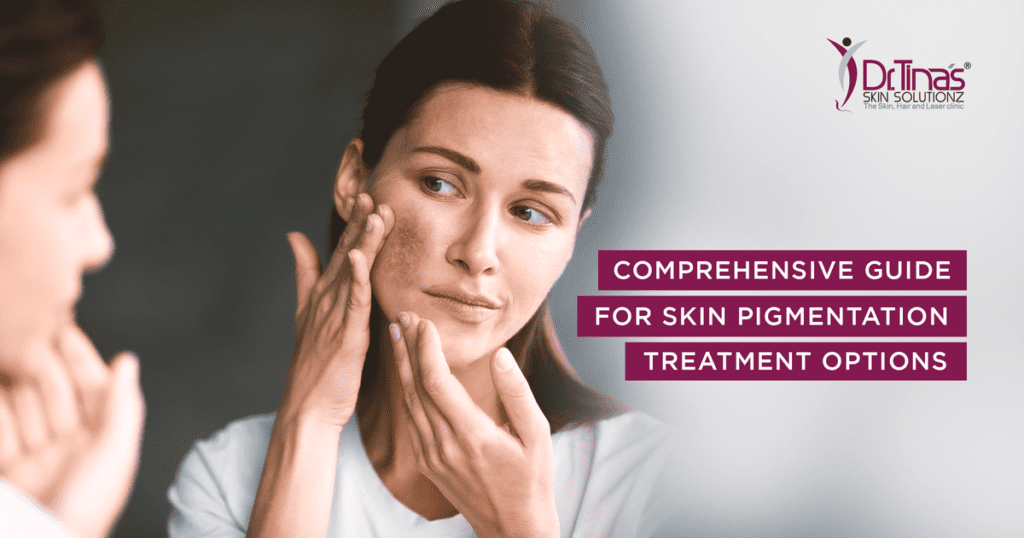Comprehensive Guide For Skin Pigmentation Treatment Options
A Comprehensive Guide to Skin Pigmentation Treatment Options

Are you worried about dark spots cropping up on your skin? Wondering what exactly skin pigmentation is and why it happens? You're definitely not alone! These patches of darker skin on your face, neck, or body are quite common among both men and women. They're typically caused by an overproduction of melanin, leading to a condition known as skin pigmentation. While there are numerous reasons for these spots or patches, they're mostly harmless and don't usually indicate any deeper health concerns. There are several treatment options available for skin pigmentation treatment in Bangalore to effectively address these discoloration and pigmentation issues. The choice of treatment depends on the cause and severity of the condition. Let's dive into the various treatment options available for different types of skin pigmentation.
Brightening Creams
Most commonly used for treating types of pigmentation like age spots or melasma, over-the-counter creams are ideal for addressing milder forms of pigmentation. Usually in a gel-like consistency, these creams are applied once or twice daily for the desired results. While these creams can be effective, they might take longer to show results compared to other dermatological procedures. Therefore, it's always best to consult with your doctor before starting with OTC creams and gels.
Professional Facials
Another way to tackle darkened patches of skin is through the use of facial acids. Facial acids are mild and work by gently peeling away the top layer of the skin. This type of skin pigmentation treatment effectively exfoliates by acting on the outer layer of the skin. Exfoliating with salicylic or glycolic acids brings out the fresh layer of skin beneath, revealing a lighter complexion and faded spots. Also known as skin acids, their effects are generally more noticeable on fairer tones with mild pigmentation.
Read More: How Professional Facials Can Enhance Your Skin's Glow?
Chemical Peels
Similar to facial acids, chemical peels are more concentrated versions of these acids that work along the same lines. Chemical peels have the ability to remove the epidermis, reducing the appearance of various types of pigmentation. Some chemical peels may even penetrate the layer beneath the epidermis, resulting in significant changes to your pigmented areas.
While many chemical peels are available without a prescription, a professional-grade peel administered by your doctor might be a better option. It's always safer to undergo these procedures with a trusted professional who can better understand the percentages of the chemicals involved. When done under expert guidance, the risks associated with these treatments are greatly reduced.
In addition, you'll receive guidance on precautions and post-care after chemical peel sessions. Chemical peels may not be the best treatment option for you if you spend a lot of time in the sun. This procedure makes your skin more sensitive to sunlight, so it could worsen pigmentation if you don't use adequate sunscreen and other UV protection. Following your chemical peel sessions, you'll need to take extra care for at least one week.
Retinoids
An ingredient derived from Vitamin A, retinoids are compounds that work wonders on your skin for a variety of issues. Retinoids not only improve collagen production but also control oil-producing bacteria. This compound is available in multiple forms, such as cosmetic and skincare products. Retinoids come in both prescription and over-the-counter forms. OTC retinoid products usually have a weaker formulation. Retinoids are often prescribed for post-inflammatory hyperpigmentation and melasma.
Laser Therapy
Another effective method to treat pigmentation of the skin is through laser therapy. Such treatments are especially effective for forms of pigmentation like melasma. Typically, laser therapies are of two types—ablative and non-ablative. They work by removing layers of your skin and promoting collagen growth, respectively. A popular skin pigmentation treatment in Bangalore and other cities, lasers are completely safe for treating skin pigmentation issues.
Recommended Reading: Is Skin Brightening Right for Your Skin?
Dermabrasion
Dermabrasion is a surgical procedure involving an abrasive machine to remove the pigmented layer of skin. Unlike microdermabrasion, dermabrasion is performed by plastic surgeons or dermatologists. Besides being beneficial for pigmentation, this surgical procedure is also recommended for the removal of prominent acne scars and wrinkles.
Microdermabrasion
A minimally invasive procedure, this treatment option "sands" your skin to remove the top layer and reveal the fresh skin beneath. This treatment option also improves your skin's complexion and texture. Since microdermabrasion can make your skin sensitive to the sun, it's essential to protect your skin from direct exposure following the process.
Before starting any skin pigmentation treatment, it's crucial to consult with your dermatologist to determine the root cause of the issue. Different skins respond to treatments differently, so having an expert's guidance will help you make the right decision for your skin.

Dr. Tina Ramachander is one of the best dermatologists in Bangalore and Medical Director at Dr. Tina’s Skin Solutionz, a skin care clinic in Bangalore. She completed her master’s in dermatology from the prestigious JJM Medical College in Karnataka and is now a practicing dermatosurgeon and Medical Cosmetologist in Bangalore.
Instant Fresh Noodles,Bibimbap With Black Truffle Sauce,Spicy Beef Bibimbap,Spicy Crawfish With Shrimp Granules Over Noodle
Hunan Jiapin Jiawei Biotechnology Co. , https://www.foxfoodie.com